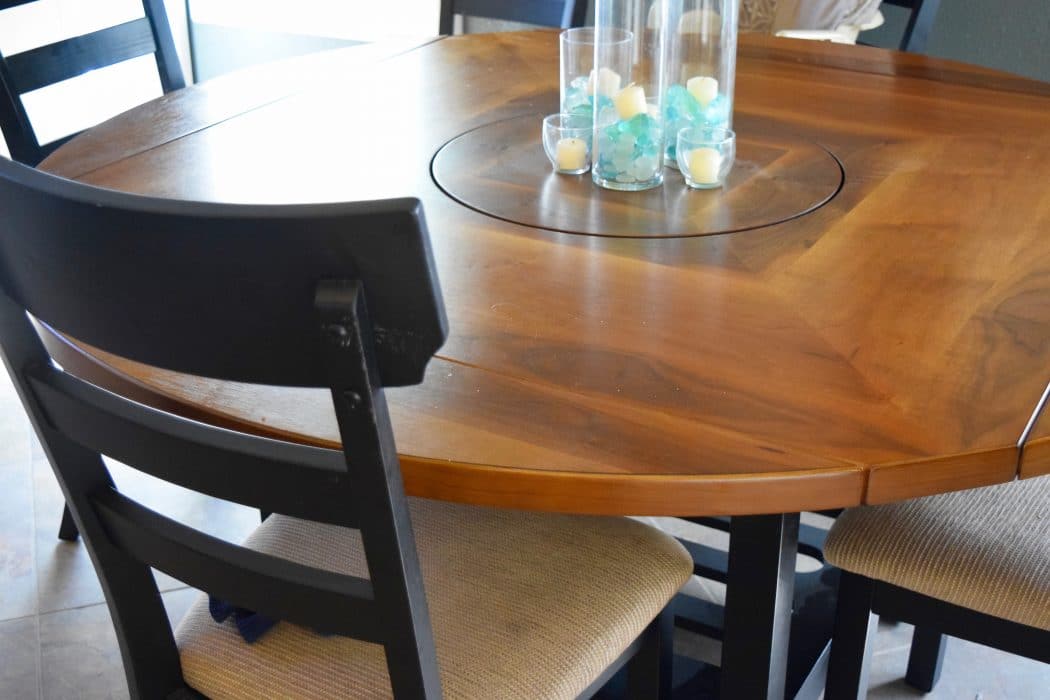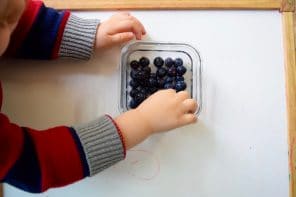Around the time that Dominik started eating solid food, it was very important to me that we all ate dinner together, at the table. At first, my husband was a little apprehensive. Eventually, it became a source of enjoyment for him, too. He grew up in a “fend for yourself” family where everyone ate different things at different times, and rarely at a table. As a child, he was used to eating alone wherever he wanted. As an adult, he was accustomed to coming home from a long day at work and eating dinner on the sofa in front of the television. So he saw eating at the table as more of a nuisance than family time in the beginning, but soon was cracking jokes and debating current events with me during dinner.
On the opposite end of the spectrum, my family tried to always have dinner together. Sometimes activities like sports or playdates interfered but as often as we could (and every single Sunday), we had dinner together. No television, no homework at the table, no cell phones (not that we had them then), just family conversation.
My experience with family dinner time stuck with me. I looked forward to the stability of a meal with my family, as a source predictability in an increasingly scary and unpredictable world. I’d like to think that it had a positive impact on other aspects of my life, as well. In fact, after decades of research, many believe that the best thing you can do for your family is to have dinner together. Family dinners:
- Boosts vocabulary. Young children are listening to adults and older children chatter at the table. They are absorbing many new words just listening to everyday conversation.
- Teach social and table manners. Eating at a table together teaches young children how a normal conversation rhythm works. It also teaches kids how to sit nicely, use forks and spoons, and how to wait for others to finish eating.
- Help kids do better in school. Statistics have found a direct correlation between eating together and success at school. In fact, kids that ate together typically did better than those that did a million extracurricular activities. Teens who had dinner with their family were twice as likely to achieve “A”s.
- Leads to better nutrition. Family dinners are typically healthier than quick ones eaten on the run. Plus, when children watch siblings and adults enjoy healthy food, they are more likely to try and enjoy it as well. It’s also worth noting that smaller portions are eaten as home.
- Lowers high risk adolescent behavior. Eating dinner together helps everyone to connect. This can alert parents to potential issues, as well as create a safe environment for teens having a rough time. Teens who had family dinners were less likely to smoke, binge drink, deal with depression and suicidal thoughts, face eating disorders, or become violent.
Why are family dinners this important and this influential?
Families, especially in today’s society, are typically very busy. One child has a sports practice, the other has a playdate, a parent is working, another parent is busy driving their kids around. With differing schedules, ages, and interests, the only time that many families are all in one place is the dinner table. It’s a time to connect, to talk, to question each other, and to learn about the experiences and day of one another.
Tips for family dinners:
- Set the table. Putting out the table cloth, dimming the lights, setting out dishes and silverware set the mood. It mentally puts everyone into mealtime-mode. My toddler definitely behaves better at a set table than on the sofa or in the carseat. Plus, the right ambience can make dinnertime feel special, calm, and inviting.
- Turn off electronics. Children who watch TV while eating are more likely to become overweight. This is because they are tuned out of their bodies natural responses to food. Without TV, they have the focus to feel full and to actually taste the food they are eating.
- Stay seated until everyone is finished. Not only does this prevent post-dinner chaos, this is a great way to teach young children about table manners. Very young children benefit from learning to wait patiently at the table.
- Take your time. A rushed dinner is stressed and no one seems to be focused on much besides shoveling food into their mouths. Pause to enjoy the flavors and textures of the food, to make jokes, have a conversation, or to just enjoy each others company.
- Keep it positive. Use dinnertime as a way to talk about everyone’s day, bring up current events, tell stories, make jokes, discuss plans. Whatever you chat about, keep it positive. The whole point of a family meal is to enjoy the time together.
Sometimes, crazy nights happen and everyone does need to “fend for themselves”. But making it a priority to sit down and eat together is a tremendously beneficial thing you can do for the whole family, even if it’s just 5 days. And although creating fun and healthy recipes adds nutritional advantages to meals, it’s okay to all sit down in front of pizza, takeout, or freezer meals. Life happens. But what I love most about family dinners is that you put life on pause to enjoy each other, no matter what’s on the plate.





